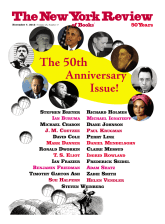In response to:
On Stage Near Shanghai from the September 26, 2013 issue
To the Editors:
I read Robert Brustein’s recent report on the Wuzhen Theatre Festival, for which he served as honorary chair, with great interest and pleasure [NYR, September 26]. But I was surprised that in it one of the most distinguished figures in American theater wrote that “Chinese playwriting is a relatively new phenomenon. (Until the early part of the twentieth century, theater in China was mostly composed of Beijing and Cantonese opera and shadow puppetry.)”
Bertolt Brecht’s Caucasian Chalk Circle is widely known. Less familiar now is the remarkable thirteenth-century play by Li Xingfu that Brecht based his script on, also borrowing the Chinese convention of characters addressing the audience and explaining the plot before engaging in dialogue. Li was one of many playwrights who flourished during the Yuan Dynasty, when the Mongol government suppressed more traditional Chinese literary forms. This golden age was brief, but should be better known in the West.
I write to plug Li and his contemporaries, not to criticize Brustein. His production of Chalk Circle is one of my favorite plays in any language.
Eric Mankin
Los Angeles, California
Robert Brustein replies:
My thanks to Eric Mankin for his helpful scholarship. My error was to omit the word “modern” in writing about Chinese playwriting, because, while the spoken play, or Huaju, apparently existed as early as the thirteenth century, it died out for a long while, having been replaced by Beijing opera. Only in the early part of the twentieth century did it experience a revival.
Aside from this, Angels in America consists of two plays, not three, as I had written.
This Issue
November 7, 2013
Love in the Gardens
Gambling with Civilization
On Reading Proust



